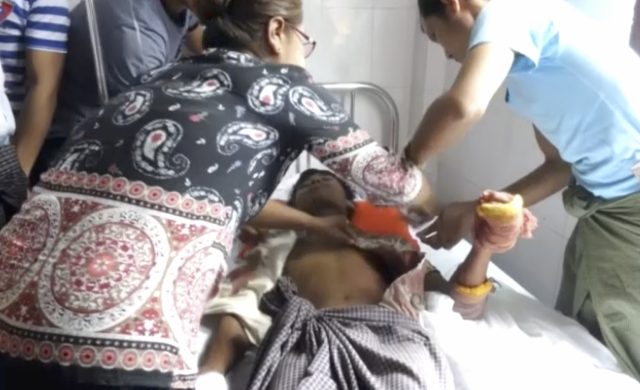96 killed in Burmese clashes begun with attacks on police posts
Witnesses and refugees on the border with Bangladesh said thousands were unable to leave Burma after trying to flee.

The death toll from violence in western Burma which began when insurgents attacked police posts has reached 96.
Most of those killed were alleged Muslim Rohingya ethnic minority attackers but 12 security personnel also died, said the office of the country’s leader.
The government and supporters of the Rohingya have traded charges of killing civilians, burning homes down and planting land mines, with the insurgents reported as having killed six people identified as Hindu.

Rohingya supporters suggest many more civilians have died in army attacks on villages and say these caused villagers to flee to the mountains for shelter or to try to cross the border into Bangladesh.
Witnesses and refugees on the border with Bangladesh said thousands were unable to leave Burma after trying to flee. Witnesses said they heard gunshots and Bangladeshi villagers said they could see military helicopters hovering.
Several hundred Rohingya got stuck in a “no man’s land” at a border point in Bangladesh’s Bandarban district, barred from moving further by Bangladeshi border guards who cordoned off about 1,000 Rohingya after they tried to enter the country.
But more than 2,000 Rohingya entered Bangladesh overnight through two points at Teknaf in Cox’s Bazar district.
A Rohingya insurgent group, the Arakan Rohingya Salvation Army, or ARSA, took responsibility for Thursday night’s attacks on more than 25 locations, saying they were in defence of Rohingya communities brutalised by government forces.
State Counsellor Suu Kyi’s office accused the insurgents of “torching police outposts and monasteries, killing innocent people and planting mines.”
ARSA, meanwhile, accused the army of using civilians as human shields.
Clashes continued on Sunday, with witnesses in the northern Rakhine town of Maungdaw saying they could hear gunshots.
Burma is overwhelmingly Buddhist, but about one million Muslim Rohingya live in the northern part of Rakhine state, where the violence is taking place.
The government refuses to recognize Rohingya as a legitimate native ethnic minority, calling them Bengalis to reflect the position that they are mostly illegal immigrants from Bangladesh. Most Rohingya are denied citizenship and its rights.
The Rohingya have long faced severe discrimination and were the targets of violence in 2012 that killed hundreds and drove about 140,000 people – mostly Rohingya – from their homes to camps for the internally displaced, where most remain.
Suu Kyi called Thursday’s attacks “a calculated attempt to undermine the efforts of those seeking to build peace and harmony in Rakhine state.”
Western nations and rights groups also generally condemned the attacks but warned the government against violent retaliation.





